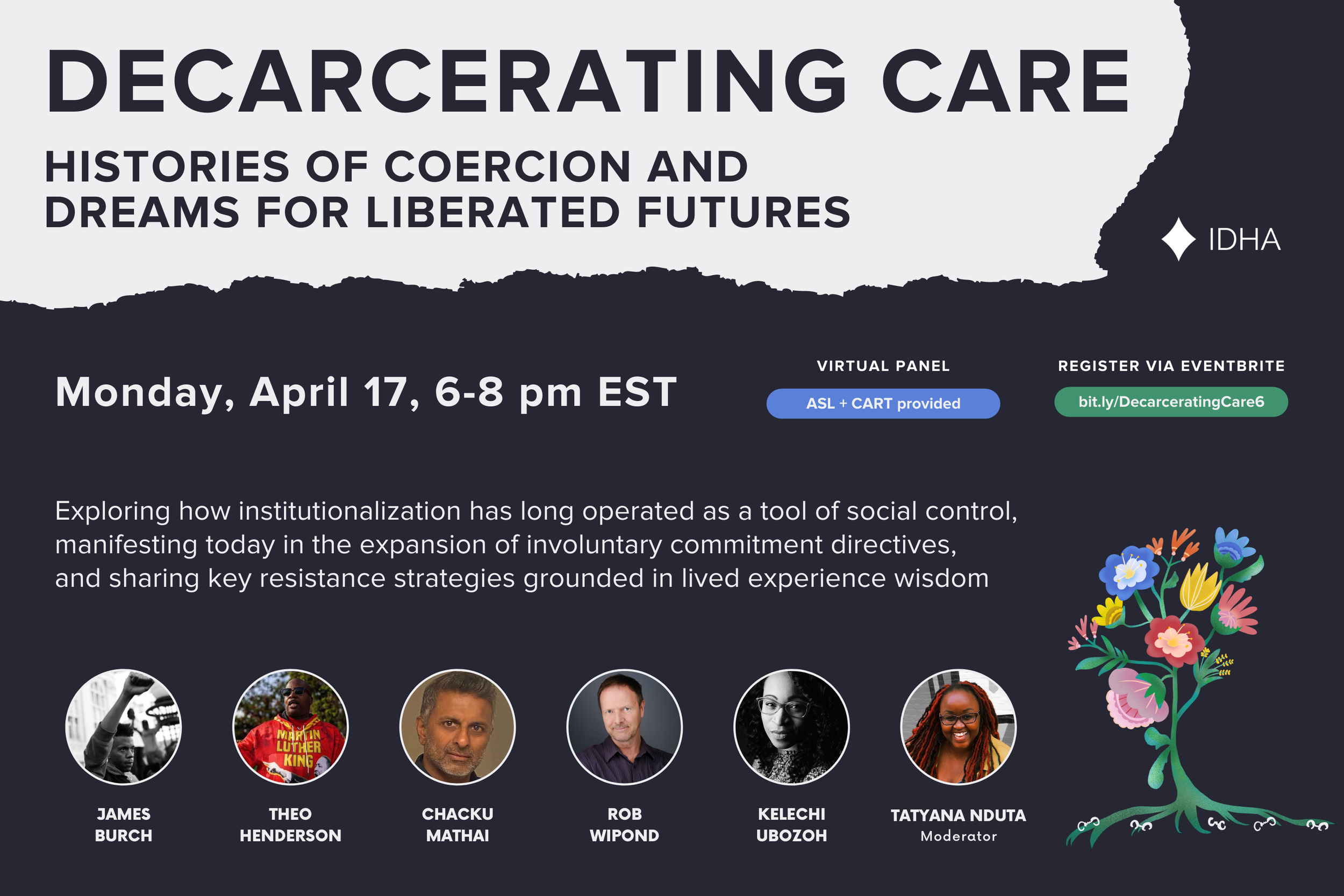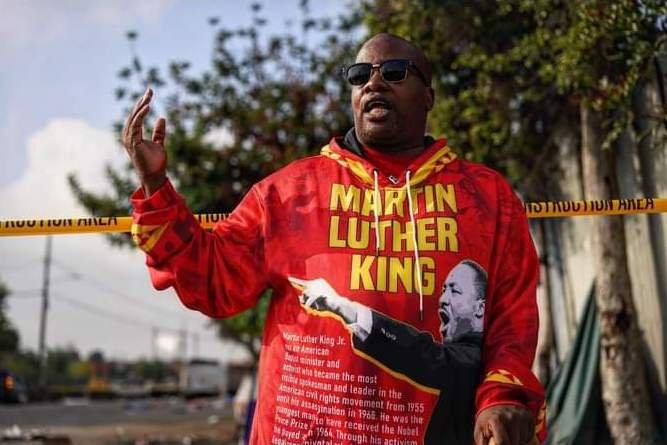About the Series
IDHA organized our first-ever Decarcerating Care conversation in September 2020, in the midst of ongoing racial uprisings in the United States and globally. As abolitionists and organizers called to divest funding from the police and some advocated for reallocation to mental health care, IDHA sought to draw attention to the ways in which the mental health care system maintains white supremacist, racial hierarchies and operates on logics of surveillance, coercion, and control. In the two and a half years since, IDHA’s five panels have reached more than 10,000 people with urgent dialogue about alternatives to policing that are rooted in the lived experience of mental health service users and survivors, movement leaders, and disabled community members.
We have thus far explored: the importance of taking policing out of mental health crisis response; the ways in which “reforms” uphold the ongoing coercion of marginalized communities; concrete steps and tools for decarcerating one's practice; how to build community-based healing alternatives; and how systems of surveillance intersect with mental health and disability.
About the Event
Psychiatry and psychology have been used to justify mistreatment and segregation since at least the early 1800s in the United States and remained largely unchallenged in mainstream culture until the 1960s civil rights era. For example, psychiatry has been used to bolster the institutions of slavery through psychiatric disorders (“drapetomania”) and scientific reports (e.g. by Dr. Samuel Cartwright) that deemed African Americans “biologically inferior” and pathologized those who tried to escape its reins (“protest psychosis”). The ideas underpinning these ideologies persist today, evident in the disparities in diagnostic rates, as well as the disproportionate criminalization and institutionalization of marginalized communities labeled as having a mental illness. There is a direct correlation between this insidious history and present-day efforts by the state to expand involuntary commitment.
On Monday, April 17, IDHA will continue the conversation with Decarcerating Care: Histories of Coercion and Dreams for Liberated Futures. This sixth installment will explore how institutionalization has long operated as a tool of social control, disproportionately impacting Black and Brown communities, manifesting today in the expansion of involuntary commitment directives nationally. A panel of activists, survivors, researchers, providers, and other advocates will explore the history and current status of involuntary commitment in the United States, centered on the factors that have shaped how people approach mental health and the impact of this history on diagnosis and the mental health continuum. We will discuss key examples in New York City and California, demonstrating what these initiatives have in common and how they are indicative of a larger pattern. We will also share key resistance strategies grounded in lived experience wisdom.
Please register via Eventbrite to join. After registering, you will receive a confirmation email with details on how to dial into the Zoom webinar.
Donations
IDHA is a small organization that strives to meet the accessibility needs of our community to the best of our ability. Our events are by tiered suggested donation to ensure we can provide closed captions on our events and other programs, though we strive to never turn anyone away. We appreciate donations of any size for those who have capacity to give.
Access
ASL + CART will be provided in Zoom. If we reach maximum capacity (1,000 people), this webinar will also be broadcast live on IDHA’s Facebook page (note that the Facebook stream will have ASL interpretation visible, but not live captions). The session will be recorded and shared with all registrants. If you have any questions about access, please email us at contact@idha-nyc.org.
Panelists
James Burch
James Burch is the Policy Director for the Anti Police-Terror Project, an all-volunteer organization that seeks to end police violence in Black and Brown communities. He began his journey in 2007 at the Southern Center for Human Rights where he investigated human rights conditions in GA and AL prisons, jails, and court systems. James left the SCHR in 2009 to study civil rights law at the Georgetown University Law Center. After graduating, James moved to the Bay Area where he worked with the Frisco 500 before joining APTP’s Black Leadership Committee and assuming the role of Policy Director. In 2018, James served as Policy Coordinator for the Cat Brooks for Oakland Mayoral Campaign. In 2019, James was hired as the Policy Director for St. James Infirmary, a peer-based occupational health and safety clinic for sex workers of all genders. James left St. James Infirmary in 2020 and now devotes his time to the Anti Police-Terror Project.
Theo Henderson
Theo Henderson is an activist, speaker, poet, educator, and podcaster living in Los Angeles. This year he was an Activist-In-Residence at UCLA and the keynote speaker at the Housing X conference. He has been published in the LA Times and KnockLA, and is currently writing for the San Fernando Sun. Theo has been interviewed for The Washington Post, New York Times, and LA Times, among others.
Chacku Mathai
Chacku is an Indian-American, born in Kuwait, who became involved in consumer/survivor/ex-patient advocacy when he was 15 years old. Chacku’s and his family’s experiences with racism and xenophobia-related assault and trauma resulted in his own loss of safety and confusing extreme states, including hearing voices and other sensory changes as a youth and young adult. These experiences, including continued racism in schools, with police, and the behavioral health system, launched Chacku and his family towards a number of efforts to advocate for alternative supports, equity, and inclusion in the community. Chacku immediately experienced the challenges of being both seen and unseen as a person of color in the psychiatric survivor/ex-patient movement, leading him to search for ways to dismantle racism in every role and initiative. He has since accumulated over thirty-five years of experience in advocating for alternatives such as peer support and racial equity in community and in behavioral health systems in a wide variety of roles, always centering lived experience and human rights. He has both held, and lost, important leadership roles in youth leadership and community organizing, executive and board management, and behavioral health infrastructure development.
Kelechi Ubozoh
Kelechi Ubozoh is a Nigerian-American writer and mental health consultant with over a decade of experience working in the California mental health system in the areas of research and advocacy, community engagement, suicide prevention, and peer support. Her story of surviving a suicide attempt is featured in The S Word documentary, O, The Oprah Magazine and CBS This Morning with Gayle King. She has spent the last two years facilitating healing-centered spaces for BIPOC employees. Her book with LD Green, We’ve Been Too Patient: Voices from Radical Mental Health, elevates marginalized voices of lived experience who have endured psychiatric mistreatment is featured in the curriculum at Boston University. More at kelechiubozoh.com.
Rob Wipond
Rob Wipond is an investigative journalist who writes frequently at the interfaces between psychiatry, civil rights, community issues, policing, surveillance and privacy, and social change. He’s the author of the book Your Consent is Not Required: The Rise in Psychiatric Detentions, Forced Treatment, and Abusive Guardianships (BenBella, 2023).
Moderator
Tatyana Nduta
Tatyana Nduta is a Kenyan non-profit executive change agent, healing practitioner, speaker, and artist who centers on creating pathways to intersectional, justice-based work to build power with communities seeking to confront, heal from, and transform from systemic harm. As a non-profit executive change agent, Tatyana has been instrumental in developing innovative programs that tackle the root causes of social issues. Her expertise in mental health and the arts has enabled her to help organizations improve their operations and increase their impact in serving their communities. She is a strong advocate for diversity, equity, and inclusion, committed to ensuring that all individuals have access to the resources and support they need to thrive. Additionally, as a practicing abolitionist, she co-creates just and courageous communities through individual and communal transformative processes. Tatyana encourages analysis, curiosity, and trust-building to shift the ways we relate to one another. She actively creates spaces for naming and responding to the impacts of systemic harm, nurturing individual and collective growth and healing.







